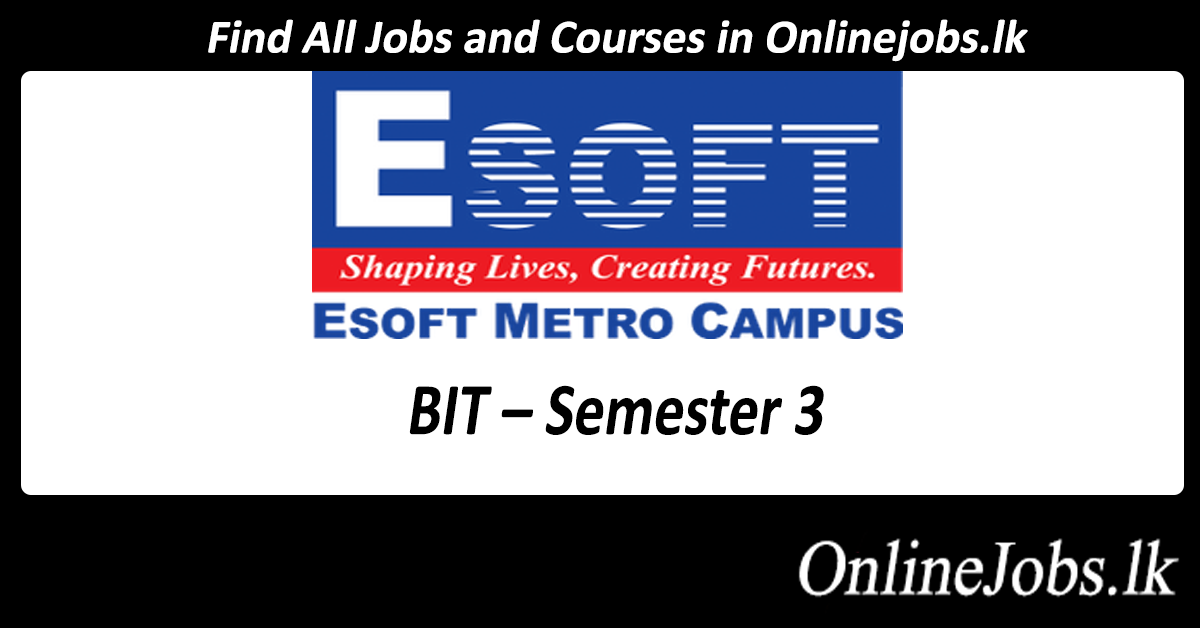BIT is the most sought after yet cost effective Academic Degree (External) Programme from the University of Colombo School of Computing (UCSC) since the year 2000 in SriLanka.
ESOFT is Sri Lanka’s #1 BIT Trainer having produced the largest share of passed out graduates including 15+ first class degree holders and 13 Gold medalists year after year.
- School leavers After A/L`s (students who are waiting results can apply)
- IT Practitioner’s looking for IT Degree
- Those who wish IT as career path
Entry Requirements
- Year 01 GPA >=2.0
The minimum duration of the BIT degree programme will be 3 academic years.
| Code | Name | Semester | Credits | |
| Semester 03 | IT3105 | Object Oriented Analysis & Design | 3 | 3 |
| IT3205 | Fundamentals of Software Engineering | 3 | 3 | |
| IT3305 | Mathematics for Computing II | 3 | 3 | |
| IT3405 | User Interface Design | 3 | 4 | |
| IT3505 | Web Application Development II | 3 | 4 | |
| Semester 04 | IT4105 | Programming II | 4 | 4 |
| IT4205 | IT Project Management | 4 | 3 | |
| IT4305 | Rapid Software Development | 4 | 4 | |
| IT4405 | Computer Networks | 3 | 3 | |
| 30 |
Duration
3 years
6 Semesters(Each Semester 6 months)
ESOFT Course Fee
Rs. 40,000
Payable as instalments: Rs. 13,000 + (Rs. 9,000 x 3)
University Fee(All Three years)
(Including Registration & Examination)
| Year1 | Year2 | Year3 | TOTAL | |
| Application Processing (when applying) |
1,000 | 1,000 | ||
| Annual Registration (For new students) |
2,750 | 3,300 | 3,850 | 9,900 |
| Course examination (Each course) |
1,200 | 1,500 | 1,800 | |
| Course examination (Enhancement course) |
1,500/ 1200* | |||
| Year Examination (minimum) |
13,800 | 12,000 | 9,000 | 34,800 |
| Project Examination Fee (Proposal & Dissertation submission) |
6,000 | 6,000 | ||
| TOTAL (minimum) | 17,550 | 15,300 | 18,850 | 51,700 |
Certification
Awarded by University of Colombo School of Computing.
Assessment Method
Test,Assignment & Practical
Useful links
BIT Syllabus
Fees and Payment Methods
BIT Hand Book
BIT Programme is designed to:
- Produce qualified ICT professionals in addition to the traditional University output
- Set professional standards and encourage students to obtain skills in commercial ICT applications and in the usage of necessary tools
- Enable those who could not enter the university to read for a degree in ICT due to severe competition to work towards obtaining such a degree
- Give an opportunity to those non-graduates already working in ICT to obtain a formal qualification in ICT through self-study.

